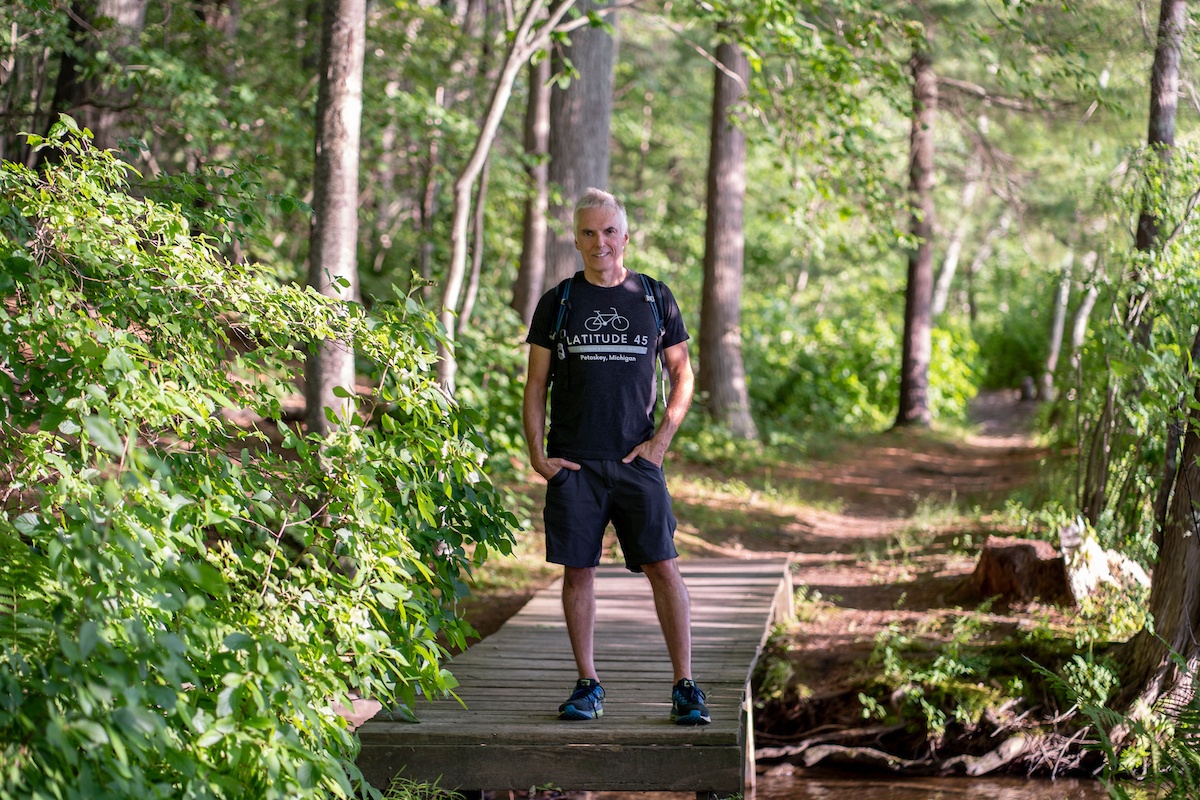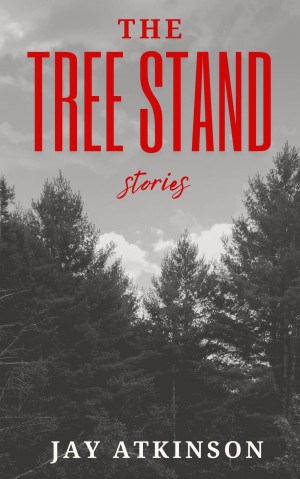Read an Excerpt of “The Tree Stand,” a Short Story about Hunting, Desperation, and Loss
A title selection from Boston University instructor and author Jay Atkinson's most recent New England-based collection.

Author Jay Atkinson in the wild. / photo by Jodi Hilton
Jay Atkinson is the prize-winning author of five narrative nonfiction and four book-length works of fiction. His nonfiction books include Massacre on the Merrimack: Hannah Duston’s Captivity and Revenge in Colonial America (Lyons Press), which won a Massachusetts Book Award in Nonfiction and Legends of Winter Hill: Cops, Con Men and Joe McCain, the Last Real Detective (Crown/Random House), which was on the Boston Globe bestseller list for seven weeks.
This is a title excerpt from Atkinson’s most recent story short collection, The Tree Stand, about Joseph “Goody” Goodreault, New Hampshire-based contractor who’s fallen on hard times.
…
The tree stand was fifteen feet above the ground, just two old planks resting between level branches and a yard of gauzy camouflage fabric suspended in front of the planks. After laying aside his quiver to allow his arm freer play, Goody rested on one knee behind the fabric, his bow held in front of him. As a child, he had imitated Pepere Benoit—arrow pointed downward, eyes bright and steady, holding himself as still as a monument. His grandfather could remain that way throughout an afternoon, which was a skill that took constant practice.
It was close enough to day’s end that target practice at the rod and gun club had ceased. Goody stayed motionless for more than half an hour, nose breathing in a slow, steady rhythm. The darkness was almost complete. What remained was the last, best minutes of light, when deer were still foraging but their poor eyesight was at its worst. Every nerve in Goody’s body was tuned to the half-acre of ground in front of him. He smelled the watery chill of the pond; heard every branch that swayed, every chirrup.

Something moved on the far side of the glen. Rising into a half crouch, Goody drew his arrow back partway, feeling the tension of the bow. Thirty seconds went by, a minute. Then a buck emerged onto the grass. It was approximately a year and a half old, with a small, four-point rack. Goody estimated the animal’s weight at one hundred-thirty pounds; the distance was twenty-five yards. He drew a slow breath, let it out, and waited.
The animal slowly moved across from left to right, halting again, its ears pricked up. Even in such low light, Goody could make out the animal’s eyes, large and black and watchful, and its hide, luxuriant with feeding, rippling over the musculature beneath. It had survived one winter, and if the animal made it through another, it would have an eight-point rack in the new season. The buck would also have acquired more scent-wisdom in its second year, making it harder to kill.
It had a scent now, however faint. The perplexed animal began circling, never coming closer to the tree stand, but not moving away, either. Making an almost complete circuit around the glade, the animal paused, looked back the way it had come, and then moved on a little ways, halting alongside a juniper bush. It was less than forty feet from Goody’s perch and at an advantageous shooting angle—a magnificent young buck, well proportioned, with a fine, sloping neck and sturdy antlers.
Goody drew the arrow back and straightened up, all in one motion. At the first sign of this movement, the animal broke for the hedgerow but Goody had let fly. The arrow whizzed down- ward at a steep trajectory. Though it was aimed a foot or more ahead of the buck’s front shoulder he leaped right into it. The sound was like that of striking a gourd. The tip of the arrow entered a spot between the buck’s shoulders and thrust outward from his chest, impaling him. The animal fell over.
Goody scrambled down from the tree and found the buck on its side, panting hard, its upturned eye already glazed and dimming. Taking his knife from its scabbard, he plunged the blade into the animal’s neck, drawing it across to sever the major arteries. The animal had stopped breathing by the time he withdrew the knife.
Goody worked fast. Taking the rope from his game bag, he fashioned a rough bridle that he looped beneath the animal’s front legs, crossed over its breast, and up behind the head, tying it off there. He slung his bow over his shoulder, took out the needle and thread to sew up the buck’s throat wound as well as its anus, and used his knife to cut off the animal’s musk glands, one pair at the inside hind leg at the hock and the other on the lower hind leg. Pepere Benoit used to say that leaving the glands in would taint the meat; Goody threw them over his shoulder into the under- brush, wiping the knife on his leg to remove any trace of the musk.
Taking the free end of the rope, he made a kind of harness that went under his arms, over his back in each direction, and fastened just below his chest. He’d have to drag the animal back to the house to butcher. He would prefer to do it in the field but he didn’t have a meat saw or hatchet, and, by hunting without a partner, he would lose what he left behind to scavengers if he attempted to make the haul in two trips. The best way of doing it, given the circumstances, was to get the animal out of the woods as quickly as possible, more or less in one piece.
Goody’s heart was beating rapidly, but the understanding that he had to drag one hundred-thirty pounds of dead weight for almost a mile muted his excitement. He could save a little time by choosing a more direct path to the road. But satisfaction lay in the fact that, despite his troubles of late, Goody now had enough venison to last out the winter—over a hundred pounds of stewing meat, steaks, brisket, and delicacies like the heart and liver. He could make use of the entire carcass, just about. He’d even be able to sell the offal to a pig farmer over in Wilton, for twenty cents a pound. In the past, though he had only hunted for sport, his family had eaten the meat after giving some of it away. Now, in a season when he had not landed a single paying job, Goody had saved the household over five hundred dollars on their grocery bill. At least that was something.
Getting the heavy, inert bulk of the animal around the hedgerow and past the lots of deadfall was a challenge. Three times, Goody had to double up the rope and carry the buck over and around a huge pile of timber. It reminded him of carrying his wife over the threshold of their room at the Old Stone Inn. Almost nineteen years had passed since he and Eloise had gone to Niagara Falls on their honeymoon. He had drunk champagne for the first time in his life, and they had dined on lobster and jumbo shrimp and fillet mignon. They even sailed out from the tiny port on the Maid of the Mist, dressed in clammy rain suits. It was the only vacation they had ever taken in the course of their married lives.
The buck moved a bit more easily over the trail, though once or twice the antlers caught on tree roots or bracken. At one point Goody stopped to fish a headlamp out of his bag and slipped it over his hat, training the beam of light on the path just ahead. He was sweating, and his boots and the cuffs of his pants were sticky with the animal’s blood. Once back on the road, he pulled the deer along the grassy center strip, its legs dragging behind in the dust. Going uphill left him breathing through his mouth, but he took long, quick strides on the descent, the carcass sliding along on the moss.
When he reached the chain stretched across the road, Goody angled off through the woods, reaching his backyard as the clouds broke up and a few stars appeared overhead. Just beyond the porch a motion detector set off the floodlights, and his oldest son, who was washing the dishes, looked out the window at him. Goody left a foot-wide trail of blood over the withered lawn and, bending down, he grasped the heavy, lifeless animal beneath its withers and about its neck, thumping it down on the porch.
The back door opened and Joey and the little ones tumbled out. “You got one, Dad,” said Joey, kneeling to examine the buck’s head and antlers.
“He’s a beauty”
“You’re all dirty,” Lynne-Marie said. Her hair was down about her shoulders and she was still carrying the toy giraffe. “I think it’s dead.”
Ben was kneeling beside his older brother now, feeling the truncated antlers and stroking the animal’s fur. Emerging onto the porch, Eloise took Lynne-Marie by the shoulders and spun her around. “Get back in the house, missy,” she said. “Now.” Clutching her toy, the girl made a set of bloody footprints going across the planks.
For several moments, Eloise remained by the door to the house while Goody cut through the animal’s hide from the anus to the head. To eviscerate the buck, he started by cutting down through the leg muscles to the skin over the pubic bone. Blood was everywhere—soaking the boards of the porch, matted on the hide of the animal, and covering Goody’s arms to the elbows. He turned the knife over and cut through the skin over the abdomen, using two fingers of his left hand to keep the intestines and stomach away from the tip of the knife. He worked slowly; if he were to puncture the intestines, the microbes in there would taint the meat. Still, the smell of the rumen was overpowering and even the open air did little to dissipate the stench.
Eloise had never objected to venison and, in the early years of their marriage, she had hunted with a muzzle-loader and participated in the field dressing of animals. But when Goody took the meat saw from his oldest son and hewed away at the breastbone and then upward, nearly severing the buck’s head, his wife reached for Ben’s hand and directed him inside. The boy didn’t complain; he had seen enough.
Lingering for a moment, Eloise watched with an apologetic expression on her face, like she regretted what her husband and son had been compelled to do. As she looked down on the butchering, a series of changes came over her face. Beneath the tint of annoyance in Eloise’s gimlet eye passed the emotions of pity, fear, abject disapproval, and then something near to acceptance, or even, understanding. It was like a dumb show of their lives together, and just as quickly it was extinguished and her eyes took on the dim, lusterless cast of the butchered animal.
Eloise was wearing a short black leather jacket over a purple skirt and shiny, high-heeled boots, being careful where she stepped to avoid getting any of the blood on them. Her throat worked up and down like she was going to say something, then she turned into the house and said, in a quiet, almost tender voice: “Somebody’s gonna have to clean that up.”
In the glare of the spotlights, Goody and Joey stood in the yard disemboweling the animal with sure, steady movements. Pepere Benoit had learned how to gut a deer from his father in northern Maine before the war, and Goody had taught his own boy what to do the summer before last. Goody severed the throat to the spine, tying a length of string around the spongy tube of the esophagus to keep from contaminating the meat. Next, he cut through the paper-thin diaphragm muscle that separated the heart- lung compartment from the main digestive tract, pulling it away from the rib cage. He removed the heart and liver, setting them in the grass at his feet.
He and Joey picked up the animal and laid it on its side. Most of the guts fell out of the open cavity, and Goody reached in to remove the last of the intestines, making a few cuts with the knife along the backbone to free the attached organs. The stomach was divided into four segments; in the first, known as the rumen, was a large ball of undigested grasses and other vegetation, which indicated that the buck had been feeding. Goody dumped the stomach and the intestines onto the ground, and then tied the nylon rope around the animal’s hind feet. He left the hide intact to keep the outer layer of meat from drying out during the aging process. With Joey’s help, he raised the buck into the air and suspended it, head toward the ground, from an eye-bolt driven into one of the beams extending from the porch. This would drain the blood from the carcass while allowing air to circulate around the body to cool it. Propping the cavity open with an old hockey stick, Goody wiped the inside of the rib cage with a damp rag and tipped the head forward, opening up the exposed throat. Already, gobbets of black blood soaked the ground beneath the animal.
Joey went into the house to fetch plastic bags for the heart and liver, while Goody shoveled the offal into a large pail that his son brought out. When that was completed, Joey washed down the porch with several buckets of soap and water from the house. Then he took a lawn chair from beneath the porch and unfolded it beside the carcass and sat down. The thermometer attached to the kitchen window marked the temperature at 39 degrees Fahrenheit, perfect for aging the meat. Joey and his father would stay up half the night, safeguarding the kill from predators while the blood drained sufficiently to leave the carcass in the cellar for a few days to tenderize it.
Cataloging his equipment, Goody realized that he’d left his quiver of arrows back at the tree stand. He stripped off his jumpsuit and without a word, reattached his headlamp and passed back over the ruined lawn and into the trees.
The beam of light jumped over the path ahead of him, illuminating the tangles of undergrowth. Soon, Goody’s boot soles met the gravel of the road and he was able to travel more swiftly, heading for the western corner of the pond. The night sky had opened up, glittering with stars, and a three-quarter moon had risen, silvering the fir trees and throwing their pointed shadows onto the road. Departing from it, Goody found the path he had taken that afternoon but at the top of the hill chose the right-hand fork, which led to the pond.
Goody used his familiarity with the terrain to descend among the thorn bushes without slackening his pace, the flat black acreage of Sportsman Pond gleaming in the moonlight.
There was an opening along the shore, a grassy embankment ringed with boulders, and Goody dropped into a gully, passing through a hedge before emerging there. Squatting by the water’s edge, he chewed on a spear of grass and contemplated the moon, floating on the pond’s surface a hundred yards off shore. The only sound was a tiny lapping noise where the wavelets met the underside of the bank. Nothing in his life seemed important now, and he had little concern for what the future might bring.
Rolling his sleeves past his elbows, Goody leaned over the bank and plunged his forearms into the shallow water. The cold numbed them almost instantly. In the beam of his headlamp, he saw the animal’s blood seep into the yellowish water, the particles scattering among the tiny fronds. His wife and Tom Futch and the Daignaults and Mary Comeau, even his beloved children, felt like they were a great distance from him, living among the stars perhaps, and looking at the still black water of the pond, Goody knew that they would be all right.
After a while, he rose from the embankment and shook off the pine needles and the chill. Winter was a certainty now, and everything that walked and crawled and flew was intent on that fact.
Jay Atkinson has taught more than 80 writing courses at Boston University; his work reflects a keen interest in the power of the landscape. Find him @atkinson_jay.

